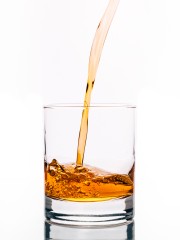
A group of Dutch, British and German specialists in psychopharmacology published a
scientific article , which clarified some aspects of the impact on the higher nervous activity of poisoning with low doses of alcohol.
Science has studied quite well the negative effects of alcohol on the brain. Studies have shown that toxic substances suppress various aspects of cognitive functionality, including self-control, working memory, and the ability to switch between tasks (multitasking). All these abilities are essential for the effective perception, processing and reproduction of speech. From this we can conclude that a drunk person will be worse to understand it and worse to speak. This is indirectly confirmed by
tests for phonetic fluency (the ability to generate words that begin with a certain letter).
In the new work, scientists set the task to investigate how alcohol use affects the ability to speak a foreign language (subjectively and objectively) in people who speak several languages.
As is known from previous scientific works (
Green and Eckhard, 1998 ), when learning and pronouncing words / sentences in a foreign language, the lexical units of different languages - native and foreign - are activated simultaneously and compete for choice. The ability to speak a foreign language depends in part on the mechanism of self-control (inhibitory control), which allows a person to choose the right element from this pair, as shown
by Kroll et al. (2008) . Since it is known that alcohol affects the system of self-control, it is logical to assume that it will also affect the fluency of a foreign language.
In theory, drinking alcohol should have a negative effect on this skill. Surprisingly, the opposite opinion is common among people who speak foreign languages. Many of them believe that when they drink a little, they begin to speak a foreign language better. The same opinion is confirmed by numerous discussions in the media and social networks, where it is confirmed by hundreds of people. In addition to these anecdotal examples, there is one
scientific study of 1972 , which really showed that a small dose of alcohol improves the pronunciation of sounds of a foreign language (Thai) in English-speaking people.
Scientists have put forward two possible explanations for this common myth:
- Drinking alcohol really improves foreign language skills.
- It seems to a drunk person that he begins to speak a foreign language better (several scientific works show that alcohol contributes to an increase in the assessment of his mental abilities in most people).
To test both of these theories conducted an experiment. The pharmacological effect of alcohol consumption was studied in a group of volunteers who were offered to drink alcohol or water (control group). One portion of Smirnoff Red (37.5% alcohol) with lemon dissolved in water was used as alcohol, after which the concentration of alcohol in a person increased to about 0.04 ppm (depending on gender and weight). Water was chosen instead of placebo - a drink that looks like alcohol to taste, but does not contain alcohol - because previous studies have shown a marked placebo effect on people's cognitive abilities. It turned out that if it looks like alcohol, it acts on people in much the same way as real alcohol.
To evaluate the possible effect of a subjective increase in self-esteem in drunken volunteers, they were also offered to solve problems that were completely unrelated to the main experience (arithmetic). The person’s self-esteem was measured before and after the substance was consumed.
Initially, the researchers put forward a number of the most obvious hypotheses that they intended to test during the experiment. They suggested that after drinking alcohol, people would report a subjective improvement in foreign language skills (increased self-esteem), but they would objectively show the worst results in this skill. It was assumed that an unreasonable increase in self-esteem is also confirmed in the arithmetic test.
The experiment involved 50 undergraduate students of the Maastricht University (the Netherlands), who had German as their first language, but who had passed the entrance exams in Dutch.
Real results did not confirm the hypotheses. First, the subjective assessment of their abilities among drunk students practically did not change (55.53 against 53.59 on a 100 point scale, see table). Secondly, the assessment of linguistic skills by outside observers (objective assessment) was significantly higher for students who drank alcohol than for students who drank water (61.53 versus 56.65). The results are shown in the table.

Scientists offer various explanations for this strange phenomenon. Perhaps a small dose of alcohol reduces the effect of anxiety, which prevents a person from speaking a foreign language: a drunk person is banally less nervous - and he begins to speak better. But this is only a theory that requires additional research.
The scientific article was
published on October 18, 2017 in the
Journal of Psychopharmacology (doi: 10.1177 / 0269881117735687).